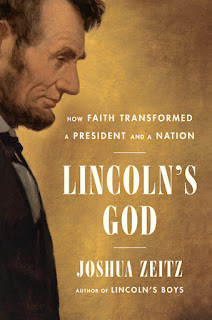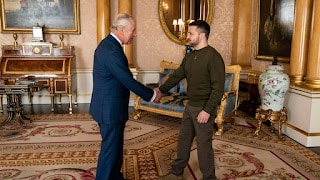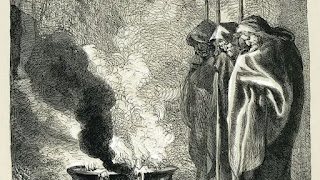Another Lincoln book!
Joshua Zeitz’ Lincoln’s God: How Faith transformed a President and a Nation (Viking, 2023) is indeed another book about Lincoln, but specifically it is a book about Lincoln’s faith (or lack thereof) throughout his life and how the Civil War affected that presidential faith. And it is also at least as much (maybe more) about the nation’s faith – and, thus, the second half of the subtitle, How Faith Transformed a Nation – and how that national experience of faith was reflected in and affected by the Civil War.
Lincon’s assassination – occurring on, of all days, Good Friday – transformed Lincoln the politician and wartime president into a national (and evangelical Christian) martyr. That is the Lincoln we were all introduced to, back when we still taught history in schools and still celebrated civic holidays. While not completely wrong, that memorialized imagery has had to coexist uncomfortably with the historical Lincoln, who never joined a church. He did occasionally attend Sunday services with his Presbyterian wife, but for the most part he kept his religious beliefs (such as they were) to himself. At the same time, he did clearly come to appreciate the growing importance of evangelical Christianity in American public life and especially its interpretive function in relation to the Civil War, which he in turn effectively adopted.
Joshua Zeitz, an historian who has taught at Harvard, Princeton, and Cambridge, and has authored six books, two of them related to Lincoln, addresses this unique dilemma effectively in this book, which is really as much (maybe more) about the religious transformation of the country as of Lincoln himself.
As for Lincoln, Zeitz stresses his apparent attraction to the « greater individualism, personal agency, and self-improvement, » which increasingly characterized the 19th-century U.S. (exemplified by Methodism’s rise). This, Zeitz suggests, estranged Lincoln both from his father and from his father’s anti-moralizing, hyper-Calvinist religiosity. « Just as Abe gradually came to reject a life of manual labor, he appears also to have rejected his family’s religious worldview. »
In doing so, however, Lincoln to some extent « swam against the currents, » for « America in the first half of the nineteenth century was a deeply Christian and predominantly evangelical nation. » Zeitz recounts the familiar story of 18th-century colonial religious decline, dramatically reversed by the two Great Awakenings, the second of which corresponded chronologically to Lincolns childhood and youth. The author does a great job retelling this important story, so central for understanding how and why the U.S. became the most religious country in the developed world – and remains so still even if some recent trends have dented that luster. And Zeitz does not neglect the religious revivals’ impacts on enslaved Africans in the U.S. and the consequence development of a distinctive Black evangelical Christianity in this country, which played its own particular part in the religious drama that accompanied the Civil War.
Lincoln, however, studiously stood apart from all this. He « determinedly avoided the wave of evangelical enthusiasm that crashed over New Salem and other parts of central Illinois. » While he shared the Bible with his contemporaries as their common literary inheritance, it was not for him the same source of certain religious truth that it was for so many of those contemporaries. Indeed, it was even alleged early his career that Lincoln had written « a blasphemous essay. » However, he grew « notably more circumspect in his criticism of religion, perhaps out of deference to his wife, Mary Todd Lincoln, who joined a Presbyterian church. More likely, as he grew into respectable adulthood, Lincoln learned to bite his tongue. »
The interesting question, of course, is how much his growing circumspection, natural enough in a public person who must be respectful of his constituents’ belliefs, how much did it reflect any inner change in Lincoln’s real feelings and attitudes?
What cannot be denied is that, as a young and aspiring politician, Lincoln « stood deliberately aloof from the evangelical backdrop of his age, even when other men on the make might have found it easier to join a church, offer a token nod to commitment, and feign belief. For Lincoln, intelligence, sound morality, and a reverence for civil laws were the foundation of a good society. »
But another unavoidable fact about American society in Lincoln’s era is that « the vast majority of reformers were ardent Christians. » In particular, « the vast majority of abolitionists were evangelical Christians, motivated by the same spirit of perfectionism and holiness that stirred them to participate in a broad field of other social reform movements. » Indeed, one Massachusetts abolitionist characterized the movement against slavery on the eve of the Civil War as “thoroughly and emphatically a religious enterprise.”
Even so, as late as the 1858 Lincoln-Douglas debates, Lincoln « held to a strictly secular indictment of slavery. There is no doubt that Lincoln considered slavery a moral offense. He said as much on the hustings and marveled at Douglas’s unprincipled refusal to condemn or support the institution. » Yet, increasingly « Lincoln’s speeches increasingly sounded the language of Christian moralism, » and Lincoln grew « more attentive than in earlier years to the religious sensibilities of his audiences. » Lincoln was, Zeitz observes, « acutely sensitive to the growing political importance of evangelical churches and philanthropies, which by 1860 were unqualifiedly the largest and best organized pillars of American civil society. »
Then came the war, which many evangelicals affirmed « was both a holy undertaking and potentially a regenerative mission. » The U.S. Civil War would claim the lives of approximately 750,000 Americans, tragedy on a monumental scale – « a scale no American had seen then or has seen since. » Meanwhile, even closer to home the Lincolns lost their own dear son Willie while in the White House, which especially connected Lincoln to the larger national experience of mass death.
By 1863, Lincoln’s proclamations increasingly reflected « a markedly biblical tone and providential message. » Obviously, this « reflected Lincoln’s keen sense of audience—a nation of evangelical Christians who believed in their ability to achieve redemption through repentance and faith, many of whom were anxious to know that soldiers who died as Christians would be saved. » At the same time, he suggests that Lincoln « may also have come to perceive and justify his role as a central actor in a historical drama, driven by a divine, though invisible, force. »
Zeitz powerfully describes the effect of the war on the American people and on their religiosity. Some 2400 clergy served as chaplains – including 70 Catholic priests. « The gap between clergy and laypeople closed quickly. The war’s evolution from a struggle to maintain the Union to a battle for the liberation of four million enslaved human beings ultimately brought the Protestant churches and their members into close alignment with the Republican Party in a way that influenced not just the next several decades of American politics, but the coming era of American Protestantism. » Ironically, the one-time skeptic even came to be seen as « a sort of half way clergyman.”
In fact, Lincon won reelection in 1864 « largely on the strength of their lopsided support among native-born Protestants, particularly those in rural areas. » (The anti-war Democrat carried the Catholic vote.) Lincoln’s second inaugural address, on March 4, 1865, was « a wholly different style of address from anything that preceded or followed it—deeply spiritual, borrowing heavily from the style of the King James Bible, reflective of Lincoln’s personal spiritual journey and crafted to lend religious meaning to a war that would soon draw to a close, but whose aftershocks Americans would continue to feel for decades to come. » For Frederich Douglas, Lincoln’s last great speech was “more like a sermon than a state paper.”
Zeitz concludes that « Abraham Lincoln, who was both a lifetime iconoclast and an uncanny student of public opinion, was the first president to channel the spiritual currents of his electorate into a powerful political movement. Though he was never a conventional believer, his spiritual evolution was sincere, and it prepared him to work within the evangelical united front to help Americans understand the historic times in which they lived, and their role in that story. The strength he derived from his faith in divine intention, despite his uncertainty, to the very end, that God willed that the Union win the Civil War, enabled him to hold the Union together through violence and to initiate the death of slavery. »
Perhaps the complete character of Lincoln’s personal religious transformation can never be fully known. But there can be no ambiguity about the religious transformation of the nation during his lifetime, nor about how effectively Lincoln as President expressed and marshaled the developing religiosity of the country, all of which Zeitz describes and analyzes so well.




